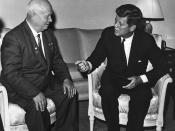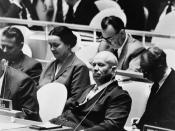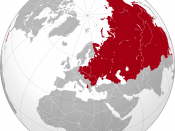Although Khrushchev could not be consistent in all of his foreign policies during 1953 to 1960, his involvement in the Cold War was instrumental to the eventual full diffusion of tension between the United States and the USSR. He made his intentions of ending monolithic communism, reducing army costs and promoting a "peaceful co-existence" clear when he came into power, and the inconsistencies in action can be largely attributed to the response and influence of the West and its Eastern allies, respectively.
Under Stalin, the USSR was incessantly preparing for US aggression, while trying to rebuild a war-torn Soviet Union. The dilemma was the choice between bread for the Russian people and protection for the nation, both of which were essential to the country's survival. Khrushchev did not inherit a Russia that was free from bondage, and thus he had to find a way to negotiate with the West in order to buy peace and so to concentrate on the rebuilding of the USSR. And thus, he, as the First Secretary of the Communist Party, presented his initial ideas of reform through his secret speech in February, 1946 to more than twenty-four million people, including the Komsomol (Soviet Communist Youth), eventually publicized internationally with the help of Allen Dulles. Even so, many orthodox historians might argue that the measures taken in Budapest during the Hungarian uprising in 1957 would testify against the supposed liberalization of the Soviet sphere. The same claim could be made about Czechoslovakia, though again, Sergei Khrushchev, son of Nikkita Khrushchev and a historian as well, would eventually claim that the Soviet military involvement prevented a civil war that would have been even more detrimental.
Having established his political stance, Khrushchev also began to cut his military financing and forces, which was about 5.5 million...


